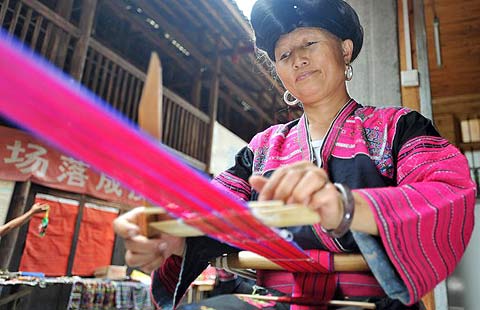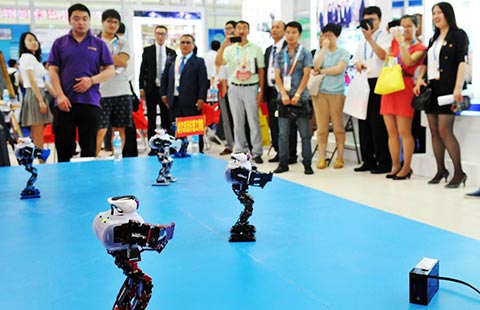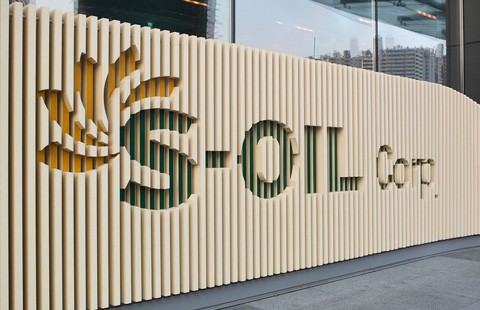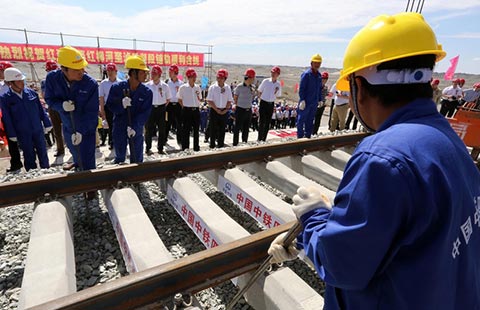FTA expected this year
By Li Jiabao in Beijing and Wu Jiao in Seoul (China Daily) Updated: 2014-07-04 02:54Countries agree to boost renminbi settlement and set trade targets
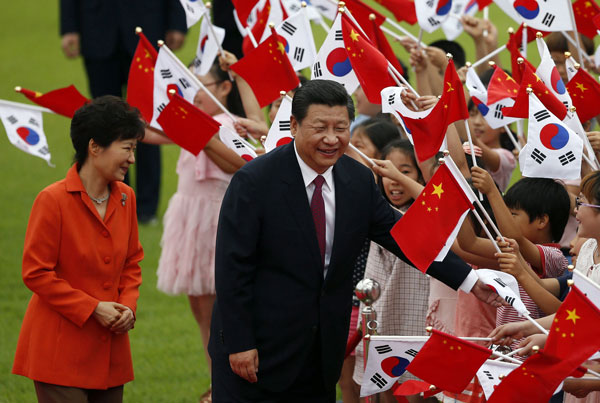 |
|
President Xi Jinping and South Korean President Park Geun-hye greet children during a welcoming ceremony at the presidential Blue House in Seoul on Thursday. [Photo/Agencies] |
China and South Korea pledged on Thursday to conclude negotiations on a free trade agreement before the end of this year, but experts said major difficulties remain in sensitive areas.
President Xi Jinping started a two-day visit to South Korea on Thursday, his first after taking office last year. A joint statement issued after his meeting with his South Korean counterpart Park Geun-hye evaluated progress made on forging a comprehensive free trade pact.
The two countries also agreed to boost renminbi settlement and investment while setting a $300 billion annual trade target for 2015.
"I'm optimistic about the prospect of the talks for the China-South Korea FTA as both sides are aware of the difficulties for each other. I believe the pact will be established before the end of this year," said Shen Minghui, a researcher at the Chinese Academy of Social Sciences' Institute of Asia-Pacific Studies.
Zhuang Rui, deputy dean of the Institute of International Economy at the University of International Business and Economics in Beijing, said that progress is "slower than expected and the pact should be signed as soon as possible".
China and South Korea launched the FTA negotiations on May 2, 2012. The 11th round of talks was held in Sichuan province in late May. The 12th round is scheduled to take place in South Korea in mid-July, according to the Ministry of Commerce.
The pact is expected to cover 14 sectors including goods trade, trade in services, investment, environment and e-commerce.
Shen cited some sensitive areas in the talks. "While South Korea is reluctant to lower its tariffs on agricultural products, China is concerned about opening services sectors," he said.
China is the largest trading partner of South Korea. China-South Korea trade volume has been more than the combined value of South Korea's trade with the United States, the European Union and Japan.
In the January-May period, trade between China and South Korea rose 5.3 percent from a year earlier to $115 billion. South Korea's direct investment in China surged 88.3 percent year-on-year while China's investment in South Korea surged 180 percent, according to the ministry.
"The establishment of a China-South Korea FTA will provide a modality as well as a driving force for the progress of a China-Japan-South Korea FTA and a Regional Comprehensive Economic Partnership," Shen said.
The three countries are holding negotiations on a trilateral FTA. They are also negotiators for the Regional Comprehensive Economic Partnership that covers 16 economies in Asia.
Economic integration in East Asia is facing difficulties in recent years and a bilateral FTA will "advance trade and investment facilitation in the Regional Comprehensive Economic Partnership framework", Zhuang said.
Shen cited some sensitive areas in the talks. "While South Korea is reluctant to lower its tariffs on agricultural products, China is concerned about opening services sectors," he said.
China is the largest trading partner of South Korea. China-South Korea trade volume has been more than the combined value of South Korea's trade with the United States, the European Union and Japan.
In the January-May period, trade between China and South Korea rose 5.3 percent from a year earlier to $115 billion. South Korea's direct investment in China surged 88.3 percent year-on-year while China's investment in South Korea surged 180 percent, according to the ministry.
"The establishment of a China-South Korea FTA will provide a modality as well as a driving force for the progress of a China-Japan-South Korea FTA and a Regional Comprehensive Economic Partnership," Shen said.
The three countries are holding negotiations on a trilateral FTA. They are also negotiators for the Regional Comprehensive Economic Partnership that covers 16 economies in Asia.
Economic integration in East Asia is facing difficulties in recent years and a bilateral FTA will "advance trade and investment facilitation in the Regional Comprehensive Economic Partnership framework", Zhuang said.
- China, S. Korea vow to finish FTA talks before end of 2014
- Weaving profits, tradition with hand-made dresses
- S.Korea, China agree to launch Won-Yuan trading market in Seoul
- Li feels central region's pulse
- Beijing, Seoul agree to directly trade currencies
- China, South Korea aim to conclude FTA by year-end
- 'Open sesame' for Alibaba IPO investors on NYSE
- Bulk property investment in Shanghai falls 14%
